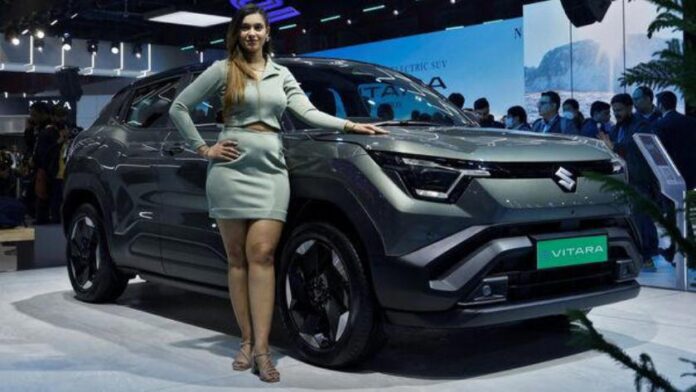Maruti Suzuki, India’s largest automaker, is confronting a range of challenges as it tries to establish a foothold in the electric vehicle (EV) market.
The company’s ambitious EV rollout — centred around its first all-electric model, the e-Vitara — has been disrupted by a global supply crunch of rare earth materials, forcing the automaker to drastically scale back near-term production targets, Reuters news report said.
This setback is unfolding at a time when competition is intensifying and Maruti’s traditional dominance in the Indian passenger vehicle market is being tested.
Tata Motors currently holds the lead in the Indian electric car market. Other significant players include MG Motor India, and Mahindra & Mahindra.
Key Challenges in Maruti Suzuki’s EV Journey
Rare Earth Supply Constraints
Maruti has slashed its April–September 2025 e-Vitara production target by nearly two-thirds—from 26,512 to just 8,221 units — due to limited availability of rare earth elements essential for EV components like permanent magnets. The shortage stems from China’s export curbs, which have disrupted global automotive supply chains. While some U.S., Japanese, and European automakers are beginning to secure export licences from China, Indian manufacturers, including Maruti, are still in limbo.
Competitive Pressure in EV Segment
Maruti is facing mounting competition from Tata Motors and Mahindra & Mahindra, both of which offer feature-rich electric SUVs and have taken early leads in India’s nascent but fast-growing EV market. This competitive edge is eroding Maruti’s overall passenger vehicle market share, which has slipped from 51 percent in 2020 to 41 percent in 2024.
Delays in EV Launch and Market Entry
Despite launching the e-Vitara with fanfare at Auto Expo 2024, Maruti has yet to open bookings, prompting concerns from analysts that the company is lagging behind the market. Tesla’s anticipated entry into India this year could further increase pressure on Maruti to deliver a compelling EV proposition quickly.
Strategic Retrenchment
Reflecting a more cautious stance, parent company Suzuki Motor has scaled back its India EV strategy —cutting its sales target for FY2031 to 2.5 million vehicles (from 3 million earlier) and reducing planned EV models from six to four.
Maruti Suzuki’s Mitigation Strategies
Revised Production Phasing
To mitigate short-term disruptions, Maruti has adopted a phased production plan. While H1 FY2026 targets have been lowered, the company intends to ramp up significantly in the second half of the year, aiming to produce nearly 59,000 units — more than 7x the first half’s revised volume. This approach is designed to ensure that the annual target of 67,000 e-Vitaras remains within reach.
Export-Oriented Strategy
A significant portion of e-Vitara production is earmarked for export to Europe and Japan — markets where Suzuki has strong brand equity. By aligning with Suzuki’s global EV ambitions, Maruti aims to leverage India as a cost-effective manufacturing base for overseas demand, despite domestic headwinds.
Focused Portfolio and Rationalization
In response to rising costs and supply uncertainties, Suzuki has opted for a more focused EV portfolio. Rather than pursuing breadth, it aims to concentrate on select, high-potential models that can be produced and scaled efficiently.
Long-Term Localization and Supply Chain Realignment
Though not explicitly detailed, it is likely Maruti will accelerate efforts to localize critical EV components and reduce dependency on vulnerable supply chains — particularly for rare earth materials. Strategic partnerships or investments in alternative magnet technologies or rare earth recycling could be on the horizon.
Outlook
Maruti Suzuki’s entry into India’s EV space is marked by both promise and pressure. While the e-Vitara is critical to meeting government targets of 30 percent EV penetration by 2030, its success will depend on how swiftly the company can navigate rare earth shortages, reclaim market momentum, and meet consumer expectations in a rapidly evolving landscape. With Tesla entering India and domestic rivals already ahead in EV deployment, Maruti cannot afford prolonged delays — or conservative execution.
Baburajan Kizhakedath

